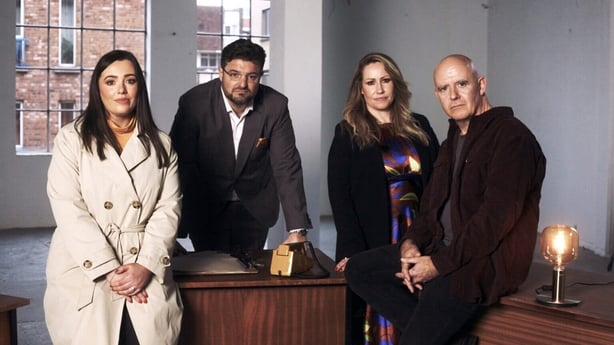Anyone can fall for a scam if pushed in the right ways and in the right circumstances, says Amy Molloy, Social Affairs Correspondent for the Irish Independent.
Speaking to me ahead of the premiere of The Complaints Bureau, RTÉ One's new consumer series that starts on Thursday 7 March, Molloy recalled some recent attempts on her own finances.
"I've had cases where someone accessed my bank card and in one case they use it to buy a guitar in Canada", she said. "Maybe I had to use a site to pay for something and they traced my card details through that. But it was just kind of scary that someone could just use my bank card even though I had it in my own handbag at home.

"In another case I got a call from my bank saying my card was used to try and purchase a car in America. Obviously I wouldn't have that much money in my current account!"
Molloy joins journalists Conor Pope and Siobhan Maguire in the new series as they tackle consumer problems big, small and seemingly intractable, all under the guidance of finance expert Eoin McGee. The show, Molloy said, has given some frightening insights into the rise of scams and financial fraud in Ireland and abroad, from medical tourism to parking charges in hospitals and more.
Scams, she said, are massively on the rise in recent years, with some becoming more sophisticated each year. "Every week I'm getting between five and 10 messages from people, that text, 'I've lost my phone. Can you text me back on this number?'" Molloy said.
While we would all like to think that we're savvy enough to spot a scam, Molloy said that "anyone can fall for these type of scams". She added that scams and ploys like these are designed to trick you into paying by playing on your fears: "If you get a text saying you owe money, I think naturally you start to panic a little bit.

"A lot of good people who are very intelligent and very in the know, actually ended up losing money because of these types of scams."
The show aims to start conversations about these incidents in the hopes of educating and warning others, Molloy said. "I find Irish people in general, we're a very proud nation and when people fall victim to these type of scams, we don't really like talking about it because there's a sense of embarrassment about it. I think it's really important that they do because it can literally happen to anyone.
"You could be having a really busy day in work, you're up the walls, you have a million things to be doing. You get this text like telling you you have to pay custom charges for a package being delivered, you click into and pay it and before you know it you realise your bank account has been emptied. And it's scary."
Getting justice for the people affected by these scams and consumer issues is a key focus of the show, as Molloy said that trying and failing to get your money back, or even get an answer from a company helpline, can be extremely "disheartening".

"Unfortunately, because in some cases, the people who are committing these crimes are based in foreign countries and they're using fake numbers and burner phones and have ways of blocking their IP addresses, in a lot of cases, these scammers are never fully tracked down", she said.
In other cases, consumers are "stonewalled" by a lack of customer helplines or care, which can be deeply frustrating, Molloy added. "Some of the companies we were dealing with don't really have helplines anymore. You're constantly dealing with online chat forms or you're sending emails and getting automated responses. And in a lot of the cases, people just couldn't get through to people on the phone from these companies.
"If you're sending emails constantly, if you're always being stonewalled, you just give up and get tired eventually. The cynic in me would think maybe sometimes companies can take advantage of that because they know that people might just get fed up eventually and not bother fighting it."
In some of the cases on the show the team were able to get a customer's money back, but Molloy stressed: "That shouldn't be the case. It shouldn't be up to us to get in touch with these companies for the refunds to be issued."
There are even more tragic instances of fraud when it comes to medical tourism, which Molloy and the team encountered on the show. "Unfortunately, some of these stories have ended tragically. We heard of women travelling to Turkey for weight loss surgeries and unfortunately, they didn't come home alive."

Social media, she said, plays a huge role: "If I want to sign up to Instagram or Facebook, I don't have to show any ID. All you need is essentially a phone number and an email and you can set up a profile. That's why we're seeing these people setting up these fake profiles using names that aren't their real names."
When it comes to avoiding being caught, Molloy suggested verifying with the company that is allegedly trying to contact you before transferring money, and ensure that a website you're transferring money through has "https" in the address and has a secure lock symbol.
"Our message will be to always stand up for your rights, know your consumer rights, and don't give up on trying to get your refund, because at the end of the day, it's your money, you're owed it", she said.
"Things are not cheap at the moment. We're in a cost of living crisis, rent is expensive. Bills are really significant at the moment for people. And if you're owed a few hundred euro from a company, a few hundred euros to some people might not be a lot of money, but for other people it is."
Watch The Complaints Bureau on Thursdays at 7pm on RTÉ One.

